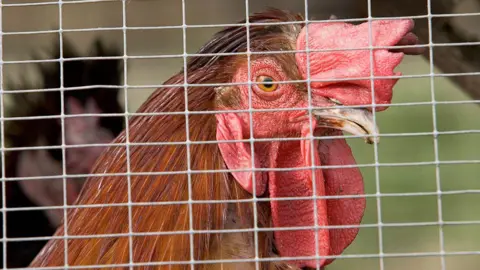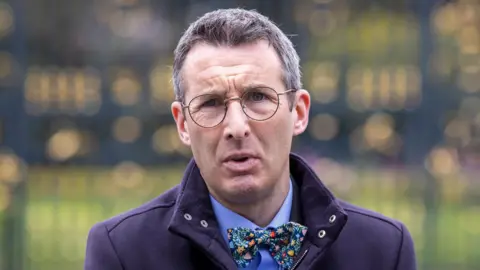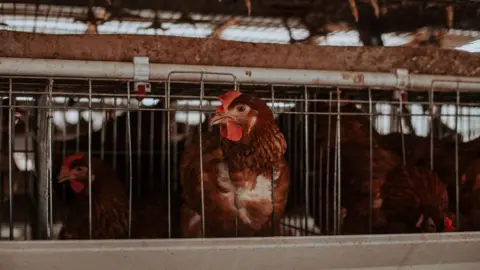Bird flu measures to support poultry and egg industry
 Getty Images
Getty ImagesAll bird keepers in Northern Ireland are required to keep their birds indoors from Monday.
The order from the Department of Agriculture, Environment, and Rural Affairs (Daera) is designed to stop the spread of bird flu.
It requires owners of pet birds, commercial flocks, backyard flocks, and hobby flocks to keep their birds indoors or otherwise separate from wild birds.
On Saturday, Daera said about 64,000 birds were to be culled in County Tyrone after suspected avian flu was reported at a commercial poultry premises.
The decision to keep birds indoors was made before this.
A ban has also been implemented on certain bird gatherings.
Announcing the measures, Agriculture Minister Andrew Muir said: "Poultry and egg production contributes significantly to the economy, valued at over £600m, and it is vital that we do all we can to support industry efforts to keep [bird flu] out."
Muir welcomed that similar measures were also being introduced in the Republic of Ireland.
 PA Media
PA MediaMuir described the suspected outbreak at the business as a "wake-up call" but said "there hasn't been any other reports beyond this farm".
Speaking on BBC's Good Morning Ulster programme, Muir said there would be some support for farmers who are affected, but there were no plans to help them with the loss of income.
"There will be a replacement for the cost of birds that have been humanely culled and we will work within our budget to cover that," he said.
He also said he did not have any "concern" around risks to human health.

Farmer Mark Robinson, from County Tyrone, said the newest regulations could have a massive effect on the industry.
"You do worry about the family that's just got the bad news that they had bird flu there because yes, you'll get compensated for the birds, but you've lost that income," the Clogher Valley councillor told BBC News NI.
"There's such a close-knit community of poultry farmers in Mid Ulster and the Dungannon area - it's a big concern."
Robinson said many poultry farmers were at the "mercy" of wild birds.
"Most of the cases that's been found prior to this is wild birds, and all it takes from my understanding and what the experts are saying is a wild bird flying over your house, dropping faeces on to the roof, and it gets its way into the house," he added.
"You can control the biosecurity aspect of it, but you can't control whose house it happens to fly over."
 Getty Images
Getty ImagesChief veterinary officer Brian Dooher said he expected the order to be in place for up to eight weeks.
"I am urging all flock keepers to please take action now to improve biosecurity so as to reduce the risk of transmission of avian influenza to poultry or other captive birds," he added.
A biosecurity checklist is available on the Daera website.
The order followed a preliminary positive result for bird flu in a small number of captive birds at a nature reserve outside Magherafelt.
Following the tests, the premises in County Londonderry was closed to the public, and a number of restrictions were put in place around the site, including the humane culling of the remaining captive birds.
Bird flu restrictions in Northern Ireland were eased in April 2023, following an outbreak which began in October 2021. It was described as the largest ever in these islands.
However, strict biosecurity protocols have remained in place.
In December 2024, the highly contagious virus was detected in a dead wild buzzard found in County Galway.
It was the first confirmed discovery on the island of Ireland since September 2023.
The deputy president of the Ulster Farmers Union, Glen Cuddy, said the number of birds culled in County Tyrone was "small in the bigger picture but not for that farm".
Speaking on Radio Ulster's Good Morning Ulster programme, Mr Cuddy said: "It will decimate our poultry industry here in Northern Ireland if it goes widespread. Hopefully it can be contained.
"We encourage everyone who has even a few hens for eggs, geese, ducks, to make sure they are housed and have no access to wildlife."
